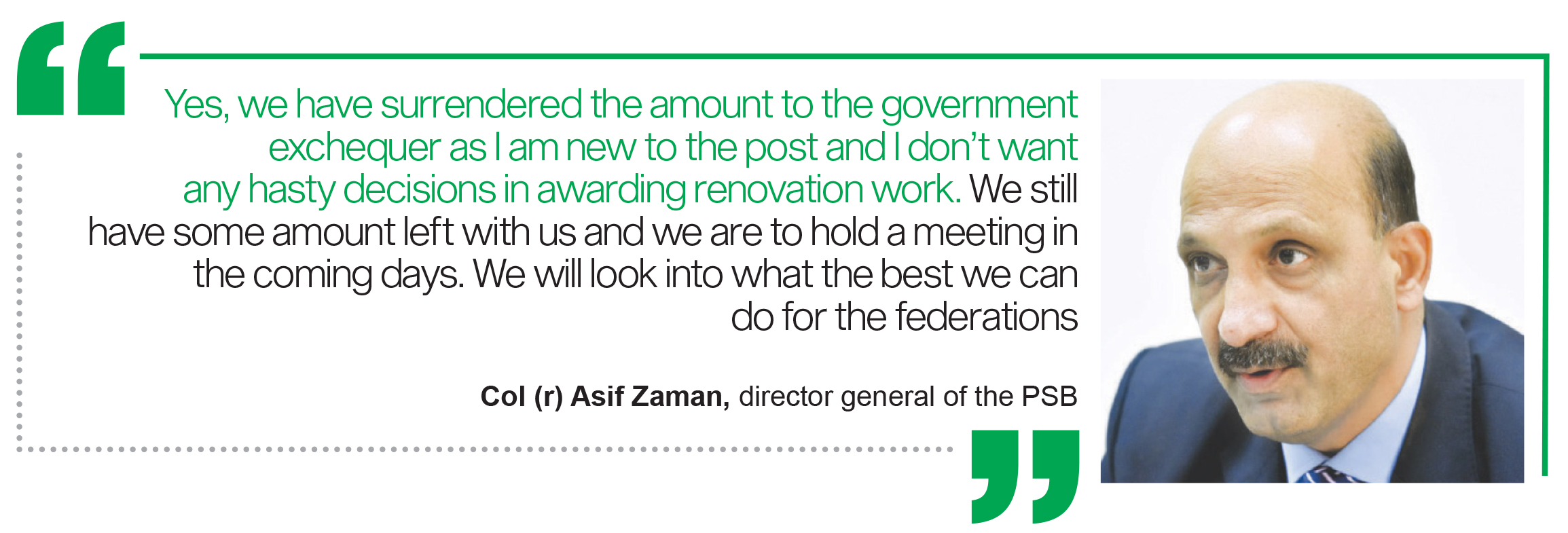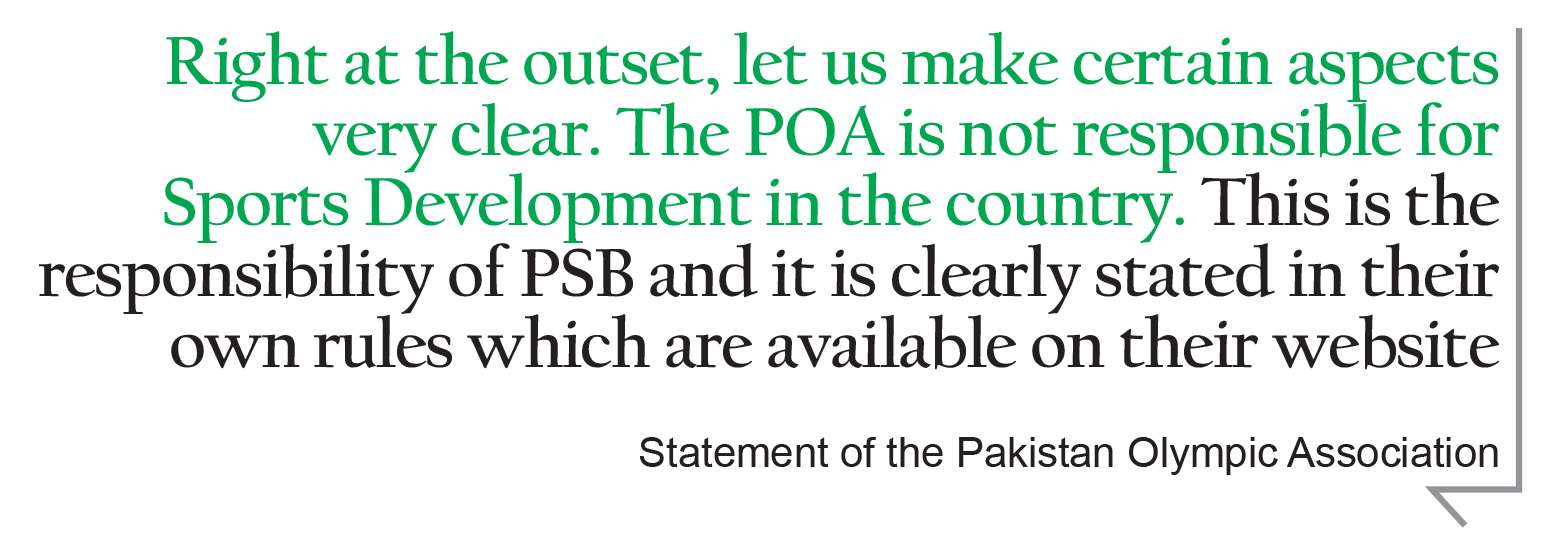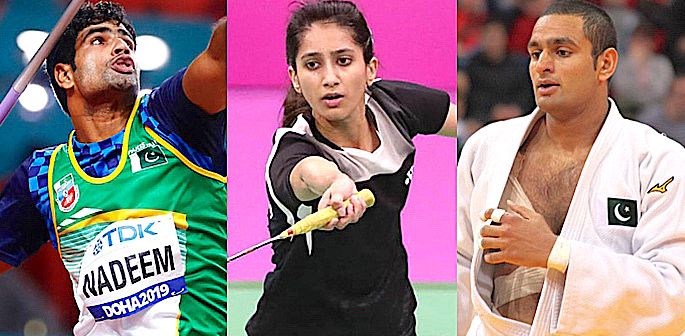It was an agonising watch this month as not one but two Pakistani athletes made it close to the medals podium at the Tokyo Olympics. Talha Talib from Gujranwala and Arshad Nadeem from Mian Channu both finished in fifth place. Their close brush with bronze means Pakistan’s olympic medal drought has extended from 29 years to at least 32 – with the next chance at success coming in Rio 2024.
Since the games ended, there has been a fierce back and forth over who is responsible. Blame has naturally been directed towards the Pakistan Olympic Association (POA) and its longstanding chairman Lt Gen (r) Arif Hasan. The POA has in turn responded and pointed out that they are simply responsible for promoting olympic values and player development falls squarely under the jurisdiction of the Pakistan Sports Board (PSB) run by the federal ministry of Interprovincial Coordination (IPC). The truth lies somewhere in between.
It seems that both the PSB and the POA are happy to point fingers at each other and let the whole matter die down in a whirlwind of confusion and accusations. However, both are to blame for different aspects of Pakistan’s Olympics woes. Much has been made of the squalid conditions in which athletes have to train in Pakistan and how they have to fund themselves to make it to the games. This story will focus on where the money comes from, or at least where it should come from, for olympic athletes and why we should be spending more not just on our olympians but all players of different sports.
The Olympics
Before we begin discussing Pakistan’s Olympic failures, it is necessary to try and understand how the Olympics work. Here is the first thing you need to know: the International Olympic Committee (IOC) does not give a single dime, cent, or rupee to any athlete for participating in the games. They also do not provide travel and lodging. Most countries have their own Olympic Committees that provide travel and lodging as well as coaches and support staff to athletes, but even in the United States of America (USA), athletes do not get salaries unless their sport, their team, their federation, or they personally have been sponsored by a private organization or individual.

As such, being an Olympian is not necessarily lucrative. Not just in Pakistan but all over the world most Olympians hold day jobs and work in different capacities until it is time to train for the games. This tradition of not paying athletes is a holdover from the time when the Olympics were an event exclusively for amateur athletes. It was not until 1971 that professional athletes were allowed to compete in the Olympics – which meant that Olympic athletes were now also allowed to receive compensation, sponsorship from national and sports organizations as well as private businesses. In fact, the amateur nature of the competition did not completely end until 1986, which is when professional athletes were allowed to compete in every Olympic sport.
Essentially, if you are a star athlete and manage to win big at the Olympics, you have a real shot at making some serious money through endorsements and corporate sponsorships. Winning can also land you in other careers such as coaching and even acting. However, once again this is usually a very select group of athletes and most have to go back to their day jobs after competing at the most prestigious sporting event in the world.
Meanwhile, the International Olympics Committee makes a pretty penny through the games every four years. The International Olympic Committee is entirely privately funded and ever since the first modern Olympic Games in Athens in 1896 it has relied upon contributions from commercial partners in order to stage the Games and support the Olympic Movement.Because the IOC is a non-profit organisation, 90 percent of the revenues from the Games go straight back into sport and athlete development. In total, around USD 2.5 billion is put towards the staging of the Olympic Games, to ease the financial burden on the host cities.
Since the Olympics are very widely watched, around 73% of this revenue comes from broadcasting rights. The rest of this broadcasting rights money is highly prized and contested between different countries. Take, for example, the United States Olympic Committee (USOC), which has an astounding $845 million at their disposal over a four year period between games. Of this massive budget, $120 million comes from corporate sponsorships. The rest all comes from US-only broadcasting rights.
For a country like Pakistan, getting any broadcasting deals is unlikely because of the very small viewership numbers. What is important is that 90% of revenue that the IOC distributes for the development of players and sports all around the world. This is where the POA comes in – the organization is not just responsible for promoting Olympic values and anti-doping regulations, it also has the critical role of being the recognised organization by the IOC in Pakistan and as such it is their job to lobby for funding from the IOC – something they have time and again failed to do. However, while their negligence is apparent, it is nowhere as bad as the role of the PSB.
The PSB messes up
Right after both Taha Talib and Arshad Nadeem failed to secure medals, Shahbaz Gill, Special Assistant to the Prime Minister and newly minted hair-icon at a news conference asked retired Lt Gen Arif Hasan to resign as the Pakistan Olympic Association (POA) president, a post he’s held since 2004. Shahbaz, flanked by Minister for Interprovincial Coordination Fehmida Mirza, claimed that the failure to develop medal winning Olympians in Pakistan was a failure of the POA.
The entire presser was complete hogwash. Here is what you need to know from a Pakistani perspective: The POA is a private organization that is recognised by the IOC and it is the IOC’s liaison in Pakistan. Athletes get processed and sent through the POC and it is their job to secure funding from the IOC for our players. However, other than this and the fluffish job of “promoting Olympic values” the POA does not do much and does not have a lot of powers in terms of providing government funding or sports and player development. “Right at the outset, let us make certain aspects very clear. The POA is not responsible for Sports Development in the country. This is the responsibility of PSB and it is clearly stated in their own rules which are available on their website,” said a recent statement from the POA.

“Our organisation is representative of IOC and OCA for Olympic Movement in Pakistan and is mandated to Foster Olympism through Sports and Education. It is our stated position, duly conveyed to the concerned quarters on multiple occasions, that the existing facilities and financial support for our sportspersons are the lowest in the region despite which our athletes have made tremendous strides in their respective sports events, as is evident from Talha Talib’s performance.”
Now, the PSB is admittedly handicapped. The reason Fehmida Mirza was at this press conference in the first place was that the PSB falls under the ministry of interprovincial coordination (IPC). This is because after the 18th amendment, sports was one of the administrative categories that was made a provincial subject. However, to participate in both the Olympics and other competitions like the Asian and Commonwealth Games, athletes have to compete on a national level first to get selected for international competitions. This also means that the different federations for different sports are all structured federally, even though the dispensation of funds happens provincially.
That is why in May this year, right before the Olympics, the PSB surrendered a whopping amount of Rs440 million to the Finance Division, ahead of the financial year’s culmination, triggering the fears that some result-producing sports federations may not be given their due share of grants for the year. According to a report in The News, the bulk of the surrendered amount was meant for the assistance to sports federations. The amount comes under the non-development head, usually meant for the renovation and extending grants to the federations.
Even at the end of the financial year, there were hardly any plans of the PSB to release annual grants to the deserving federations. On the insistence of a few well-versed former officials of the PSB including former deputy director general (Technical) Azam Dar, the PSB released grants to some federations, hours before the end of financial year in June 2020.
Why they returned the money and what it means
Sports Federations are the administrative unit of sports in Pakistan. They are responsible for their respective sports from arranging competitions to preparing athletes and finding new talent. They are essentially administrative bodies made up of former athletes that manage everything to do with a given sport in Pakistan. Under the PSB, they are not getting any money to do so.
Ideally, the federations should have scouts and camps setup at schools. Schools should have facilities for different sports and produce athletes that play in interschool competitions and then get selected by the federations there. Interschool competitions also make the sports popular and that means money will flow into the sports as well. However, Pakistan is a country where there are barely any schools, and sporting culture is such that even private schools with funds do not offer facilities for track and field sports, or competitive environments for weightlifting, boxing, and other impact sports.
Since the sports federations have not been able to get the required assistance from the government or private sector, meaning that the majority of the federations channelize their own sources to keep domestic activities alive and honour international commitments. Some leading federations including tennis, squash, karate, shooting, taekwondo, wrestling, weightlifting, boxing, snooker have to spend millions of rupees to stay at par with the international and national requirements.
The PSB has claimed that their new director general, Col (r) Asif Zaman, returned the money because he was new to the job and did not want to make any rash decisions on allocation of funds. “Yes, we have surrendered the amount to the government exchequer as I am new to the post and I don’t want any hasty decisions in awarding renovation work. We still have some amount left with us and we are to hold a meeting in the coming days. We will look into what the best we can do for the federations,” he said.

However, the maltreatment of the federations is a norm. Only a year ago before this money was returned, in May 2019, The Ministry of Inter-Provincial Coordination (IPC) on Monday told a bunch of national federations that the state would only support those 18 federations which have been short-listed and also hinted that no annual grant would be given to the federations any more. According to sources, the federations were told that they would have to meet their office expenses by themselves besides holding national championships.
For the Pakistan Sports Board to then come up and try to blame the POA for the country’s more than three decade long drought in the Olympics is thus laughable. There is a lot that could be done with the POA, and it needs to do a better job at lobbying and making Pakistan’s case particularly after the underdog stories that two of its athletes had this year around, but it cannot be blamed for the state of sports in Pakistan right now.
What needs to be done
Immediately there is a lot that must happen. Players with raw potential that have made it this far completely on their own like Taha Talib and Arshad Nadeem have to be given facilities and sponsored by private companies or corporate sponsorships if the government is not coming through for them. Both of them are young and with focused training that only steady money can provide, they are still young enough to give Pakistan a serious shot at the Rio Olympics in 2024.
On a larger scale, the perfect solution is to build up a sporting culture in schools and push for reforms. However, more urgent is the immediate restructuring of the PSB, and making sure that the ministry it falls under is held accountable for letting athletes languish. The Olympics and other such events are a great opportunity for diplomacy, as well as the obsessive need Pakistan seems to have to “portray a positive image.” If not for the sake of the men and women that dedicate their lives to attaining excellence in these pursuits and their futures, then at least for the silly aim of positivity.
The need of what has to be done was summed up very well in a Dawn editorial from a few weeks ago, which stated that “It is about creating an environment to facilitate access to sports. Renovation and development of sports facilities is the first step towards that, one that will help grassroots programmes to flourish. Most importantly, schools must align themselves with the government plan and allocate sufficient time and resources to physical fitness and sports activities. It has to be a multi-tiered structure that propels the talented ones to colleges and universities up to the national level where federations, ideally run by sports professionals, will take them to the next level.”
This is what we have been advocating for throughout this piece. However, there are impracticalities in the idea. Pakistan’s schools are decrepit and many of them barely have enough facilities to educate children. Adding the dream of making them big and rich enough to have sports facilities is a very distant dream. For now, it would be better if private sponsorship and government funding keeps the ball rolling on sports in Pakistan.
Ideally, all sports should work the way cricket works in Pakistan. The Pakistan Cricket Board (PCB) makes and spends its own money as well as gets significant revenue from the International Cricket Council (ICC). It is a profitable organization. However, not all organizations can be such when it comes to sports. Some sports, like weight lifting or javelin, are not as watched and do not get the recognition that they should. This is why the government must support sports in Pakistan, and why the PSB needs to stop blaming others and actually do its job.


























There’s a massive lot of retired Army personnel to fill up sport federations. Don’t worry.